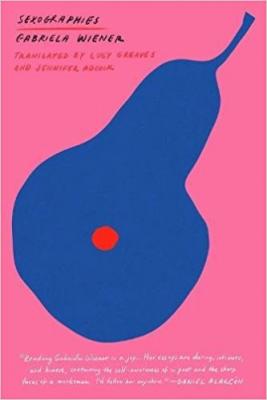Gabriela Wiener describes herself as “a journalist who specializes in putting herself in extreme situations and writing in the first person about those experiences.” In her essay “Planet Swingers,” she and her husband Jaime spend an evening at the “6&9 Club” in Barcelona “popular for catering to youngsters at the height of their appetites.” In “Advice from an Unyielding Dominatrix to a Bewildered Disciple,” she mounts the stage at Club Bizarre to feel the lash of Lady Monique. In “Three,” she welcomes another woman into her marital bed with Jaime. She declares, “I’ve always been a firm believer in not having limits, especially when it comes to sex.”
 The paragraph above may have caught your attention, but its generics hardly explain the tremulous and ambiguous effects of her work. It’s true that in Sexographies, she collects 15 steadily engrossing essays mainly about unsteady circumstances and erotic experiments. But consider her piece titled “A Weekend With My Own Death,” which begins with her plan to attend a four-day workshop called “Live Your Death” where participants will “reach a psychic representation of death, heal wounds, and find the cause of our blockages.” She introduces herself to the others: “’My name’s Gabriela. I’m Peruvian, but I’ve been living in Barcelona for eight years. I’ve come because … I’m afraid of death, more so recently, and because I feel disconnected …’ I say all this because it’s the truth.”
The paragraph above may have caught your attention, but its generics hardly explain the tremulous and ambiguous effects of her work. It’s true that in Sexographies, she collects 15 steadily engrossing essays mainly about unsteady circumstances and erotic experiments. But consider her piece titled “A Weekend With My Own Death,” which begins with her plan to attend a four-day workshop called “Live Your Death” where participants will “reach a psychic representation of death, heal wounds, and find the cause of our blockages.” She introduces herself to the others: “’My name’s Gabriela. I’m Peruvian, but I’ve been living in Barcelona for eight years. I’ve come because … I’m afraid of death, more so recently, and because I feel disconnected …’ I say all this because it’s the truth.”
Her blockages, which contribute to the voicing of her tersely insightful evaluations, are as equally critical to her narratives as her plunges. She is a sociologist of freedom: she flees from the “world of ethical bodily transactions,” but she is too psychologically acute to regard “freedom” as something fixed in time and space. She opens to pleasure, but also tightens up her observations with personal disclaimers.
Hearing a line like “I never got the knack of fidelity,” one could expect its speaker to portray herself as striding excitedly into her adventures. But Wiener’s tactically placed self-disclosures generate nuanced tensions designed to draw the reader closer and indicate the actual stakes. Some examples:
I have a tendency to ruminate, to lean in towards a voice that whispers to me day and night: ‘What if I’m an incomplete woman?’
I’ve never confessed anything. There’s something perverse in the word ‘confession.’ Within it lives the word ‘guilt.’
I suffer from body dysmorphia disorder … I worry obsessively about things I consider to be defects in my physical appearance.
My spirituality has never come out of the closet. I don’t tell anyone that I always carry around a blue stone a friend gave me to help me out of a writer’s block.
 Sexographies opens with “Guru & Family” in which Wiener is permitted to spend a few days and nights with Ricardo Badani and his six wives – but with “no camera, no tape recorder, no notebook.” A Tantra devotee and former software entrepreneur, Badani had been thrown out of Chile for his unconventional marital practices and settled in Lima where he and his six companions operate a lingerie store. She writes, “He’s been denounced as a misogynist and a homophobe with good reason: his archaic, orientalist discourse advocates for a return to the time of alpha males and female acolytes … But his story continues to fascinate me for many reasons; not the least of them being his ‘alternative’ lifestyle – he lives outside the boundaries of convention, always challenging any sort of restraint.”
Sexographies opens with “Guru & Family” in which Wiener is permitted to spend a few days and nights with Ricardo Badani and his six wives – but with “no camera, no tape recorder, no notebook.” A Tantra devotee and former software entrepreneur, Badani had been thrown out of Chile for his unconventional marital practices and settled in Lima where he and his six companions operate a lingerie store. She writes, “He’s been denounced as a misogynist and a homophobe with good reason: his archaic, orientalist discourse advocates for a return to the time of alpha males and female acolytes … But his story continues to fascinate me for many reasons; not the least of them being his ‘alternative’ lifestyle – he lives outside the boundaries of convention, always challenging any sort of restraint.”
 Wiener’s reporting, in these essays at least, yields to self-exposure in degrees that trigger and match up with the reader’s anxiety. Is she in danger? Reckless and foolish? Will she be exploited by Badani, humiliated? She admits, “I feel disgustingly comfortable in a place where us women are paid with flattery … By the end of the night, I want to be like these women … I want to stay in all day with all of my best friends and I want my home to be a place for amorous games.” The six wives, each portrayed with deft strokes, impress her with the firmness of their commitment to Badani, “a kick in the gut to any feminist and disciple of Simone de Beauvoir.” The wife named Mercedes teaches her how to belly dance. And then, Badani suggests that she undergo his “sexual-guru diagnostic.” She writes, “The man seemed unhinged … And yet, a part of me felt that I should not pass up such a unique sex ed. lesson.” How does an avowed “radicalized feminist” like Wiener square her curiosity for patriarchal domination with her values? The answer is: she doesn’t, asserting, “Badani is living proof that his experiment works.”
Wiener’s reporting, in these essays at least, yields to self-exposure in degrees that trigger and match up with the reader’s anxiety. Is she in danger? Reckless and foolish? Will she be exploited by Badani, humiliated? She admits, “I feel disgustingly comfortable in a place where us women are paid with flattery … By the end of the night, I want to be like these women … I want to stay in all day with all of my best friends and I want my home to be a place for amorous games.” The six wives, each portrayed with deft strokes, impress her with the firmness of their commitment to Badani, “a kick in the gut to any feminist and disciple of Simone de Beauvoir.” The wife named Mercedes teaches her how to belly dance. And then, Badani suggests that she undergo his “sexual-guru diagnostic.” She writes, “The man seemed unhinged … And yet, a part of me felt that I should not pass up such a unique sex ed. lesson.” How does an avowed “radicalized feminist” like Wiener square her curiosity for patriarchal domination with her values? The answer is: she doesn’t, asserting, “Badani is living proof that his experiment works.”
And yet, each of Wiener’s experiences is framed as a probe of her idiosyncratic feminist strivings. Every boundary must be queried as it is crossed. “I would have hated to come out with the typical ‘sex story’ written by an open-minded journalist,” she asserts. She will not write “panegyric[s] about anyone’s lifestyle” no matter how much she empathizes with them.
Born in Lima, Peru in 1975, Wiener has lived in Spain for several years, published poetry and fiction, edited the Spanish edition of Marie Claire magazine, and is more popularly known as a punchy columnist for La República (Peru), El Diario (Spain) and other publications. Her most recent article for La Repúblicaargues against the anti-feminist “violenta cultura” of World Cup fútbol. She is an iconoclast who has been called a “gonzo journalist.”
 So, it is strangely Wieneresque that her essay, “Isabel Allende Will Keep Writing From the Hereafter,” treads the line between Allende’s hackneyed bestsellers and the example she sets as a striving, deeply humane woman. “Isabel Allende is to literature what Shakira is to pop,” Wiener quips. “They have a handful of fun, catchy hits with a somewhat dogmatic message and enough fans to fill stadiums. Pop, that expression of the ephemeral, makes Allende paradoxically everlasting.” Allende is the blockage, “an easy target,” the ethical impediment to freedom, “in some ways my mother, because, like all mothers, she’s a beloved female figure I’d hate to become.” She says that in Allende “the consciousness of being human reaches levels that her language cannot match.” But she also respects the roles played by women of Allende’s generation “who experienced the sexual revolution, won their independence, read Simone de Beauvoir, and went on the pill; they also influenced their own reality.” She interviews the writer in her hotel, then they ride to an event in a limo:
So, it is strangely Wieneresque that her essay, “Isabel Allende Will Keep Writing From the Hereafter,” treads the line between Allende’s hackneyed bestsellers and the example she sets as a striving, deeply humane woman. “Isabel Allende is to literature what Shakira is to pop,” Wiener quips. “They have a handful of fun, catchy hits with a somewhat dogmatic message and enough fans to fill stadiums. Pop, that expression of the ephemeral, makes Allende paradoxically everlasting.” Allende is the blockage, “an easy target,” the ethical impediment to freedom, “in some ways my mother, because, like all mothers, she’s a beloved female figure I’d hate to become.” She says that in Allende “the consciousness of being human reaches levels that her language cannot match.” But she also respects the roles played by women of Allende’s generation “who experienced the sexual revolution, won their independence, read Simone de Beauvoir, and went on the pill; they also influenced their own reality.” She interviews the writer in her hotel, then they ride to an event in a limo:
… we get to talking about why women identify so much with her stories and with that optimistic vision of the world where relationships and emotions are paramount. When I bring up the topic of her haters, she repeats what we’ve heard her say so many times: ‘women’s writer’ is a term used derogatively, and she’s fought for years against this segregation … ‘There are people who say I’m a genius – do you think I swallow that? I’ve got work to do. That’s where my responsibility ends.’ Isabel Allende has turned serious. But not too much.
 One of the most moving and troubling essays is “Trans,” based on Wiener’s experiences with young Peruvian transgender people, often rejected by their families, who fled oppressions in Peru (the country has no anti-discrimination laws) to scrape together a living in Paris, sometimes as sex workers. “Trans women can sometimes present as the projection of what a man thinks a woman should be,” she writes. “That’s why heterosexual men like trans women so much. In these times, they’re the closest they’ll get to their feminine ideal.”
One of the most moving and troubling essays is “Trans,” based on Wiener’s experiences with young Peruvian transgender people, often rejected by their families, who fled oppressions in Peru (the country has no anti-discrimination laws) to scrape together a living in Paris, sometimes as sex workers. “Trans women can sometimes present as the projection of what a man thinks a woman should be,” she writes. “That’s why heterosexual men like trans women so much. In these times, they’re the closest they’ll get to their feminine ideal.”
At the core of Sexographies is a vast generosity of spirit and a wish for each of us to enter all situations through the most actual of transports, namely our bodies. To present as a person-in-a-body willing to pursue an opportunity, just as she prefers not to present herself as a journalist but rather “to be guided by chance rather than by the facts.” Thus, in “Three,” she explains the attractions of being with another woman:
I’ve heard it said that nobody knows a woman’s body better than another woman. I don’t believe that. With due attention, a man can be just as skillful. It’s not because women know where to touch. Sometimes I like to destroy the myth of the original couple and reunite with my own substance. I believe in this anti-natural magic. But, more precisely, I like to feel in another woman what a man feels in me., When a woman kisses me on the lips I perceive all the softness, smoothness, suppleness that I intuit in my own body, which others can joyfully possess but which I would only be able to know through an act of doubling or some other sci-fi procedure.
At its core, there is the figure of Wiener herself, and a wish for something always about to be attained: “I want to believe in our ability to discern, in our intelligence and ability to care without repressing ourselves.” And, as she says in her essay “#NotPee,” she also wants to believe that female ejaculation is not just hearsay.
[Published by restless Books on May 29, 2018. 256 pages, $17.99 paperback]